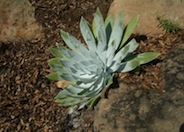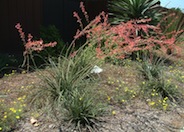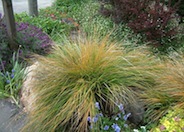
Common name:Woolly Blue Curls
Botanical name:Trichostema lanatum
The Woolly Blue Curls is an evergreen shrub that reaches 3'-5' high. It has an open branching habit and has long stalks of brilliant purple woolly flowers in the spring and summer. This shrub is native to California, is drought tolerant, and attracts hummingbirds. -Cornflower Farms

Common name:Chalk Dudleya, Chalk-Lettuce
Botanical name:Dudleya pulverulenta
Chalk Dudleya is a succulent. with 12" diameter rosette and waxy leaves; it has interesting flower spikes.

Common name:Orange Clock Vine
Botanical name:Thunbergia gregorii
This trailing evergreen vine produces large, clear orange flowers from spring through fall. It must be protected from frost and should be grown in areas of sun to part shade. -Monterey Bay Nursery

Common name:Red Yucca
Botanical name:Hesperaloe parviflora
This spectacular succulent is wonderful for a desert garden, with rosettes of gray green leaves to about 3'-4' tall and 6' wide. Red flower stalks emerge during spring and remain on the plant until the end of summer. This shrub will spread to form a crowded grass-like clump. This evergreen shrub is drought resistant but will appear better and bloom longer with added moisture. It does well in full sun, reflected heat, poor soils and cold temperatures to at least 0 degrees F.

Common name:Pheasant's Tail Grass
Botanical name:Stipa arundinacea
Pheasant's Tail Grass is a beautiful, fine, airy grass that is emerald green in color. It has many soft yellow, beige flower stalks in the spring. This grass grows 10"-12" tall , 1'-2' wide and is drought tolerant. -Cornflower Farms

Common name:Liquidambar, American Sweet Gum
Botanical name:Liquidambar styraciflua
A tall, deciduous tree of upright, pyramidal habit, the Liquidambar has dark green, maple-like leaves that turn beautiful shades of red and yellow in the fall season. It can be used as a single specimen, hedge, or grouped plant.
| Designer: Homeowner | Orange Clock Vine Trellis |
Photographer: GardenSoft |
Soils and Compost:
Physical weed control, including mulching, or hand removal protects the watershed from harmful chemicals.
Water Saving Tip:
Mulching and adding compost to soil can minimize evaporation and help soil absorb and store water.
Integrated Pest Management:
Drip and other smart irrigation delivers water directly to roots, allowing no excess water for weeds.

